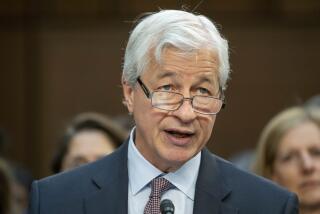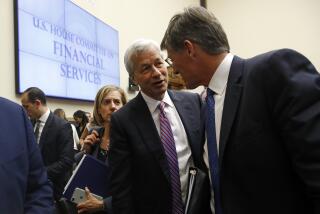Jamie Dimon set to testify before Senate Banking Committee
WASHINGTON -- The “King of Wall Street” returns to Capitol Hill today, this time to explain how JPMorgan Chase & Co. sustained a $2-billion hole in its “fortress balance sheet.”
Jamie Dimon, JPMorgan’s chairman and chief executive officer, will face questions from the Senate Banking Committee on how the vaunted bank was stung by risky bets like those that bedeviled its Wall Street peers in the financial crisis.
JPMorgan last month disclosed at least $2 billion in losses from risky derivatives trades. The disclosure has put renewed focus on how strongly regulators should craft rules put in place by the 2010 Dodd-Frank financial overhaul, particularly the so-called Volcker Rule, which curbs banks’ ability to trade with their own funds.
In his prepared testimony, Dimon puts the trading loss in a larger context of the $350-billion portfolio managed by the bank’s chief investment office. The portfolio overall is managed conservatively, Dimon says, but the trades at issue where “poorly conceived and vetted.”
“When we make mistakes, we take them seriously and often are our own toughest critic,” Dimon says in his prepared testimony. “In the normal course of business, we apply lessons learned to the entire firm. While we can never say we won’t make mistakes -- in fact, we know we will -- we do believe this to be an isolated event.”
Dimon has been Wall Street’s point person in Washington ever since JPMorgan emerged relatively unscathed from the 2008-09 financial crisis.
In his January 2010 testimony before the Financial Crisis Inquiry Commission, Dimon touted JPMorgan’s performance, calling it a “safe haven for depositors.”
“As a result of our steadfast focus on risk management and prudent lending, and our disciplined approach to capital and liquidity management, we were able to avoid the worst outcomes experienced by others in the industry,” Dimon said then.
Sen. Tim Johnson, the South Dakota Democrat who chairs the Senate Banking Committee, outlined some of his questions for Dimon in his own prepared remarks.
“So what went wrong? For a bank renowned for its risk management, where were the risk controls?,” Johnson says. “How can a bank take on ‘far too much risk’ if the point of the trades was to reduce risk in the first place? Or was the goal really to make money? Should any hedge result in billions of dollars of net gains or losses, or should it be focused solely on reducing a bank’s risks? As the saying goes, you can’t have your cake and eat it too.”
RELATED:
Volcker favors keeping bank chiefs on New York Fed board
New York Fed chair supports keeping Jamie Dimon on board
House panel to question Jamie Dimon on June 19 about JPMorgan loss






